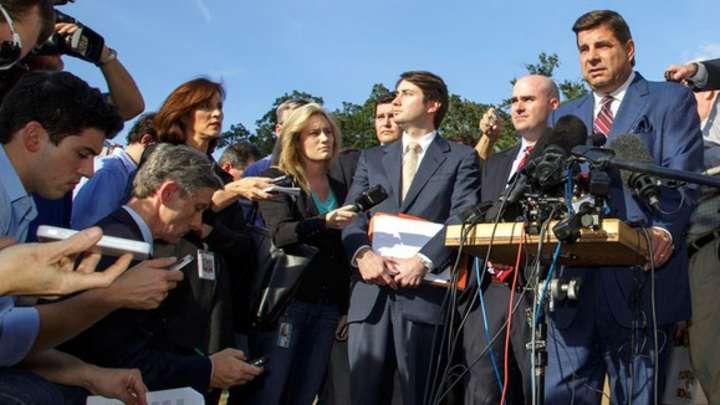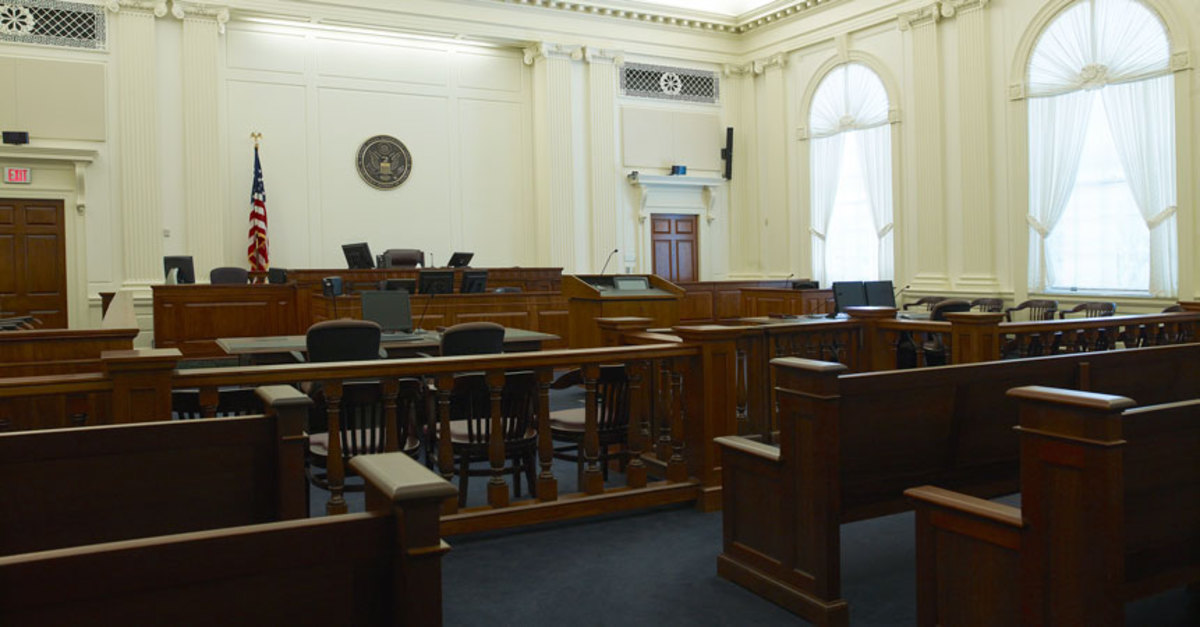What happens when a player gets arrested? A look into how the legal process plays out

You've probably heard this story before. You might have heard it this week. A football player gets arrested a week before the season opener. He is suspended indefinitely. Breathless stories about his arrest and suspension fill the Internet and the airwaves. Then, for a few weeks, there's silence.
The next piece of news is usually a far-less-breathless account of a visit to court on the change-of-plea docket. The terms of the player's plea bargain are explained, and—depending on the severity of the offense—he rejoins his team or is booted from the roster. That's how the coverage typically works. But what happens during those days and weeks between the arrest and the resolution of the case?
Tim Jansen can help explain. Jansen is a Tallahassee, Fla., defense attorney who has represented multiple Florida State and Florida A&M players—including former Seminoles quarterback Jameis Winston, who wrote that Jansen is "the best lawyer in the land" on a jersey hanging in Jansen's office. Jansen has also represented then-Baltimore Ravens defensive back Corey Fuller when he was acquitted of gambling charges, a school principal-turned-FBI informant, the man accused—and later convicted—of detonating two pipe bombs on the Florida A&M campus and Parliament Funkadelic leader George Clinton. That last one produced a tremendous thank-you note after Jansen's firm worked a plea deal on a drug possession charge for the "We Want the Funk"singer.
Jansen agreed to guide Campus Rush through a hypothetical case to help explain how the process works. After that, Jansen put on his other professional hat to explain what the player must then do to help protect his draft status. Last year, the NFL Players Association certified Jansen as a contract advisor. That's a long way of saying he has also gotten into the agent business. Jansen's first clients were three former Florida A&M players, all of whom laughed and offered a definitive "Nooooo" when asked if they'd been Jansen's clients in a legal capacity. One of those clients, cornerback Terry Johnson, is currently on the roster of the Canadian Football League's Montreal Alouettes. Agent Jansen is still waiting to land his first NFL client. Maybe it'll be our hypothetical player.

Joe Raedle/Getty Images
The arrest
That hypothetical player is Joseph Blow, a fourth-year junior receiver at Tech U. With a good season, Blow can put himself in position to be an early-round NFL draft pick. But the season is not off to a great start. On the Saturday before the opener, two police officers knock on the door of Blow's apartment. They have come to ask about a laptop that was reported stolen. Blow, who has no criminal record and has never been questioned by the police before, lets them in. Once inside the apartment, the officers notice a laptop under the bed in Blow's room. After matching the serial number on the laptop to the computer that was reported stolen, one asks Blow where he got the laptop. Blow replies he bought it from a man selling computers out of his trunk. Unmoved, the officers tell Blow to come with them to the station. They read him his Miranda rights and whisk him away.
Not long after, Jansen's phone rings. It's a coach giving him a heads-up that Blow's mother will be calling. Within minutes, Blow's mom has reached Jansen. She's hysterical. She lives a 10-hour drive away, and all she knows is her son is at the police station. Jansen informs her that the fee to retain him is $2,500, with half payable up front. If necessary, he can take a credit card over the phone. Jansen has to do this, because he doesn't want his clients embroiled in NCAA troubles later. "I can't do special treatment that I wouldn't do for other people," he says. With the $1,250 payment made, Jansen is ready to begin defending his client. He is already at the police station, because he began driving there as soon as he got the heads-up from the coach.
The first few moments of client contact are critical. Jansen immediately tells new clients to stop talking to the police. "These kids, 18, 19, 20 years old, they don't know the ways of the world," Jansen says. "They certainly don't know the legal system. If they did, they wouldn't be at the police station without a lawyer."
In Blow's case, Jansen would ask the police to allow him to confer privately with his client. He would then ask his client two key questions.
What are you charged with?
What have you told them?
There is one question Jansen will not ask in this high-pressure moment, though. "I don't ask them what they did," he says. "Because if they make a statement that implicates them, it limits your ability to defend them later." This entire conversation could happen in as little as 30 seconds. "We'd make a quick decision," Jansen says. "Sometimes it's hard to get that kid's trust when you walk in and I don't know him from Adam."
Jansen's next questions would be to the police. What do you have? What has he told you? The officers don't have to tell Jansen anything, but if they don't they risk him telling his client to shut up completely. "The cops are put into a bad situation," Jansen says. "They want to continue talking. They've got him right there. They don't want to give you too much, because if they give you too much, they know you're going to stop it."
The cops tell Jansen they have video from days earlier, from an apartment complex breezeway, of Blow walking out of the apartment of the person who reported the laptop stolen. In the video, Blow appears to be holding a laptop. Jansen tells his client to shut up, because in his brief conversation with Blow he learned that Blow told the cops the bought-from-the-trunk story.
At that point, Jansen calls Blow's mother and updates her on the situation. He then places a call to one of the team's coaches. "I've got bad news for you," he says. "He's probably going to be charged. It's probably going to be a felony." Jansen says the coaches' response is usually the same. Let us know.
The next day or two
If this hypothetical scenario took place during the off-season, Jansen could take his time to either build a defense for trial or work a deal. But with the season opener only days away, the clock is ticking. Because most laptops are worth more than $300, Blow has been charged with a felony. (That's the law in Florida, and we'll use Florida laws in this hypothetical because that's where Jansen practices.) Tech U., like many schools, has a policy that dictates players charged with felonies must be suspended until their cases are resolved. That means Blow is banned from games, practices and the Tech U. weight room while his charges are pending.
After Blow bonds out of jail the following morning, Jansen conducts a more thorough interview. If there were actually a man selling computers out of the back of his trunk, Jansen would dispatch his investigator to find that person and interview him. But Jansen knows the police have the video, so he also knows there is no man selling computers out of the back of his trunk. Blow admits he panicked. He had never been in that situation before, so he didn't know what to do or to say.
Jansen still doesn't ask the question most people would. "When anybody comes in here, we don't ask him 'Did you do it?'" Jansen says. "And trust me, they never tell you they did it." Even though an admission of guilt would be protected by attorney-client privilege, attorneys are not protected from the law against perjury. "If a client comes in and says, 'Yeah, I took the laptop,' then if we have to go to trial, I can't put him on the stand and have him say he didn't take the laptop because I'd be supporting perjury," Jansen says.
By now, Jansen has probably fielded calls from reporters about the case. On some occasions he has gotten calls from beat writers while driving to the police station to meet his client. Jansen offers each a brief statement that Blow has retained his services and that all communication should go through Jansen. "You have to make a response," Jansen says. "The only bad response is no response." Jansen has also told Blow to avoid giving any interviews. This doesn't guarantee reporters won't try to contact Blow directly, but most will deal with Jansen rather than risk burning him as a source of information.
The next week or three
Now comes the bureaucratic part. Jansen must deal with the prosecutor's office and the court. "Either we're going to set it for trial," he says, "or we're going to negotiate something we can live with." This hypothetical case, like most of the real ones Jansen handles, is not going to trial. He'll try to work a deal Blow can live with.
As soon as possible, Jansen finds out what prosecutor and what judge have been assigned the case. He can look up the judge's schedule and find out how quickly he can resolve the case, or, if the client was contemplating a trial, Jansen could advise him based on how the judge tends to treat defendants. Once he knows the identity of the prosecuting attorney who drew the case, Jansen can begin negotiating a plea deal. In some cases, he might even get the prosecutor to drop the charge outright.
This probably won't happen given the evidence in this hypothetical case. And, Jansen says, it's less likely to happen in Tallahassee at the moment. Though the national perception is that the State Attorney's office takes it easy on Florida State football players, Jansen says the reality is that hasn't been the case for the past decade. The relationship between the prosecutor, the team and the defense attorneys who usually handle the cases isn't nearly as friendly as it is two hours away in Gainesville, where Jansen received his undergraduate and law degrees at Florida. "The climate here is not animus, but they're going to look at every player, and they're going to get a higher level of scrutiny than any other person in Tallahassee," Jansen says.
We'll imagine Tech U. players are under a similar level of scrutiny in Collegetown, U.S.A. And since Collegetown is like most other places, the relationship between the defense attorneys and the prosecutors is similar to the one between Sam Sheepdog and Ralph Wolf in this old cartoon.
[youtube:https://www.youtube.com/embed/kerUbfOQTW0?rel=0]
They're adversaries, but since they're also two equally necessary parts of the same system, they're essentially coworkers. This means sometimes a defense attorney might hold off moving a hearing if, for example, it would keep a prosecutor from missing a school recital. It also means that a prosecutor might remember that kindness and repay the favor in kind. This can come in handy when the defense attorney needs to work a plea deal quickly.
Because of the value of the laptop, Blow is unlikely to qualify for pre-trial diversion. He is going to have to do something unpleasant, whether that's serving jail time or spending days on a sheriff's work crew. Jansen may have to wait a few days for the police to forward all of the information to the prosecutor, but once that happens he can begin negotiating in earnest. It is here that Jansen's priority will dovetail with the prosecutor's priority. "The intake division, their goal is to move as many cases as fast as they can move them," Jansen says. "So if you can assist them, they can move a case."
While waiting for the police to forward their investigative information to the prosecutor, Jansen will gather all the positive info he can about Blow. His previously spotless criminal record, the fact that he is on track to graduate in December and any charity work he has ever done can help his cause. Jansen will package it all together and bring it to the prosecutor with the hope of showing that this is an isolated incident. He will ask that Blow be allowed to serve his punishment in January so he can play the rest of the season. Since jail time would be unpalatable to his client and a bad look for a guy trying to go to the NFL, Jansen will offer a no contest plea to a misdemeanor theft charge. The computer has been returned to its owner, so restitution isn't necessary. Jansen will ask for a year of probation, fines and 20 sheriff's work days as punishment. "You go to work from 7 in the morning to six at night. You're on the side of the road picking up trash," Jansen says. "You bring your own lunch. It's demoralizing. It's humbling. If you get there at 7:01, they kick you out. If you get there with alcohol on your breath, they kick you out."
Jansen is not kidding about the conditions of the work days. While they may seem like a light sentence, they can turn into jail time for a person who doesn't take them seriously. Former Florida State tailback James Wilder Jr. learned that in 2012 when he was ordered to serve 11 days in the Leon County Jail after showing up for a work day—which had been negotiated into a plea deal by Jansen after Wilder was accused of resisting an officer—with alcohol on his breath. Wilder's blood alcohol level, according to court records, was .01. By comparison, the threshold for driving under intoxication in Florida is .08. That's why Jansen advises his clients to handle the work days quickly and professionally. The alternative is much worse. "He's got to have a punishment," Jansen says. "Even if I get kids out of trouble, if there's no punishment, there's no stopping them from doing it again."
The prosecutor assigned to the case will then take the proposed deal to the head prosecutor. (In Florida, this person is called the State Attorney.) Once the prosecutor's boss accepts the deal, Blow needs to go to court on the change-of-plea docket to enter his plea of no contest. With Jansen pushing to get it done quickly, this might take place as quickly as 10 days to two weeks after the arrest. If it takes two weeks, Blow has already missed two games. If the judge doesn't have space on his calendar until the three-week mark, that's three games. In court, the prosecutor will read a narrative of the case. The judge will ask Blow if he understands the conditions of his sentence. Blow will say yes, and he will be free to go.

Archive Photos/Getty Images
The aftermath
The coach at Tech U. suspends Blow for three games, and just like the criminal justice system, Blow gets credit for time served. That Tech U. has a game against Big State in Week 4 probably has something to do with the length of the suspension.
Blow has an excellent season, and after completing his NCAA eligibility, he decides he wants to be represented by the man who worked the deal that allowed him to play. He hires Jansen as his agent, and now Jansen has to go to work again.
The NFL's Personal Conduct Policy specifically mentions property crimes such as theft as offenses for which the league can impose discipline. The fact that Blow already has a misdemeanor theft conviction on his record means he will begin his career with a strike against him, and another slip-up could result in a much stiffer penalty than if he had entered the league with a clean record. Just like Blow's 40-yard dash time and vertical jump, this will be a factor teams weigh when deciding whether to select Blow in the draft. "It'll put him on a list," Jansen says. "It'll affect his draft status."
Blow can mitigate the effects by convincing teams he made a one-time mistake that will not be repeated. Jansen will use much of the same information he used with the prosecutor to help show the act was out of character. Meanwhile, Jansen will lobby to get Blow into an all-star game such as the Senior Bowl, where he'll have a chance to showcase his skills against other excellent FBS players and meet with team executives. It is either here or at the NFL combine that Blow will admit he took the laptop. Over and over again, to any team that asks. "First you talk to your client and make sure your client gives a response," Jansen says. "Not a BS response, but a response that's accurate. If he did it, he accepts responsibility."
Jansen will insist that teams hear this from the player, not from his agent/attorney. "I always believe they want to hear from the player," Jansen says. "If the case is already resolved, they should hear from the player himself. … If it was a mistake, he should own up to it. He should say, 'I'm young. I'm stupid. I made a poor decision. I'm accepting responsibility.'"
At that point, Jansen will work the public relations angle. He'll get Blow out working in the Collegetown community, visiting middle and high schools and telling his story. Jansen will also try to make sure no one covers Blow's sheriff's work days. "Part of his thing is going to be marketing," Jansen says. "You don't want to have the image of him picking up trash."
After that, it's up to Blow to live a clean life and to prove to teams that he won't repeat his mistake. But if he does slip up again, he'll already have a capable defense attorney just a phone call away.
